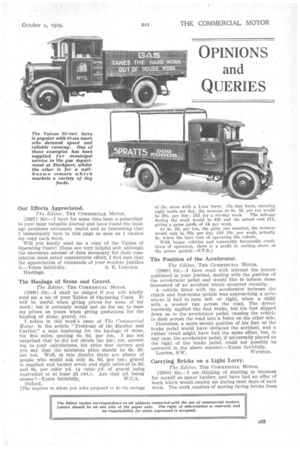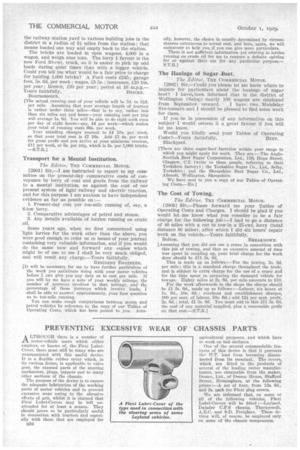OPINIONS and QUERIES
Page 67

Page 68

If you've noticed an error in this article please click here to report it so we can fix it.
Our Efforts Appreciated.
The Editor, THE COMMERCIAL MOTOR.
[2897] Sir,—I have for some time been a subscriber to your most valuable journal and have found the haulage problems extremely useful and so interesting that I immediately turn to this page so soon as I receive my copy each week.
Will you kindly send me a copy of the Tables of Operating Costs? These are very helpful and, although the enormous amount of data necessary for their compilation-must entail considerable effort, I feel sure that the appreciation of thousands of your readers justifies it.—Yours faithfully, A. E. LINCOLN. Hastings.
The Haulage of Stone and Gravel.
The Editor, THE COMMERCIAL MOTOR.
128981 Sir,—I shall be obliged if you will kindly send me a set of your Tables. of Operating Costs. It will be useful when giving prices for some of my work ; but it certainly would not do for me to base my prices on yours when giving quotations for the
hauling of stone, gravel, etc. .
I notice in this week's issue of The Commercial Motor, in the article "Problems of tlfe Haulier and Carrier," a man tendering for the haulage of stone, for five miles, quoting fis. 6d. per ton. I am not surprised that he did not obtain the job ; yet, according to your calculations, his price was correct and you say that the minimum price should be Os. 3d. Per ton. Well, in this ,district there are plenty of people who would ask only '4s. 6d. per ton ; gravel is supplied and hauled seven and eight miles at 5s. 6d. and 6s. per cubic yd. (a cubic yd. of gravel being equivalent to at least 23 cwt.). Are they all losing
money?—Yours faithfully, W.C.A. Oxford, [The inquirer to whom you refer proposed to do the cartage of the stone with a 1-ton lorry. On that basis, carrying eight loads per day, the revenue at 6s. 3d. per ton would be 50s. per day; £15 for a six-day week. The mileage during the week would be 480 and the actual cost £11, giving a gross profit of £4 per week.
At 4s. 6d. per ton, the price you mention, the revenue would only be 36s. per day, £10 16s. per week, actually 4s. below the bare cost of operating the vehicle.
• With larger vehicles and reasonably favourable conditions of operation, there is a profit in carting stone at the prices quoted.—S.T.R.]
The Position of the Accelerator.
• The Editor, THE COMMERCIAL MOTOR.
[2899] Sir,—I have read With interest the letters published in your journal, dealing with the position of the accelerator pedal and would like to inform those interested of an accident which occurred recently.
A vehicle fitted with the accelerator between the clutch and foot-brake pedals was approaching a point where it had to turn left or right, when a child with a scooter ran across the road. The driver hurriedly applied the foot brake, but his foot slipped down on to the accelerator pedal, causing the vehicle to dash across the road into a fence on the other side.
Doubtless, a more secure position of his foot on the brake pedal would have obviated the accident, and a rubber tread might have had the same effect, but, in any case, the accelerator pedal, if universally placed on the right of the brake pedal, could not possibly be operated in...the above manner.—Yours faithfully, London, S.W. WITNESS.
Carrying Bricks on a Light Lorry.
The Editor, THE COMMERCIAL MOTOR.
[29001 Sir,—I am thinking of starting in business for myself as motor haulier, and have had an offer of work which would employ me during most days of each week. The work consists of moving facing bricks from
the railway station yard to various building jobs in the district in a radius of 3i miles from the station; that means loaded one way and empty back to the station.
The bricks are loaded in open wagons, 4,000 in a wagon, and weigh nine tons. The lorry I favour is the new Ford 30-cwt. truck, as it is easier to pick up odd loads during quiet times than with a bigger vehicle. Could you tell me what would be a fair price to charge for hauling 1,000 bricks? A Ford costs £245; garage fees, 5s. 6d. per week ; wages, £3 5s.; insurance, flO 10s. per year ; licence, £20 per year ; petrol at 16 m.p.g.
Yours faithfully, BRICKS. Bournemouth. •
[The actual running cost of your vehicle will be 3d. to 3id. per mile. Assuming that your average length of journey is rather under three miles-that is to say, rather less than six miles out and home-your running cost per trip will average 1s. 6d. You will be able to do eight such runs per day of eight hours-say, 44 per week-which makes your total of runninn. costs 66s. per week.
Your standing charges amount to £4 10s, per week, so that your total cost is £7 16s. Add 13 4s. per week for gross profit and you arrive at your minimum revenue, £11 per week, or Sc. per trip, which is 5s. per 1,900 bricks. -S.T.R.] Transport for a Mental Institution.
The Editor, THE CommEaciAL MOTOR.
[29011 Sir,-I am instructed to report to my committee on the present-day comparative costs of conveyance by lorry of coal and goods from the railway to a mental institution, as against the cost of our present system of light railway and electric traction, and for this purpose I am anxious to have independent evidence as far as possible on : 1. Present-day cost per ton-mile running of, say, a 6-ton lorry.
2. Comparative advantages of petrol and steam.
3. Any details available of lorries running on crude oil
Some years ago, when we first commenced using light lorries for the work other than the above, you were good enough to refer us to issues of your journal containing very valuable information, and if you would .do the same now and forward any copies which might be of use to me I shall be very much obliged, and will remit any charge.-Yours faithfully,
RESIDENT ENGINEER.
[It will be necessary for me to have further particulars of the work you anticipate 'doing with your motor vehicles before I can give you any data as to cost per mile. If you will let me have a note of your weekly mileage, the number of journeys involved in that mileage, and the .percentage of those journeys which involve loads, I shall be able to answer, approximately, your first question as to ton-mile running.
You can make, rough comparisons between steam and petrol vehicles by reference to the copy of our Tables of Operating Costs, which has been posted to you. Actu ally, however, the choice is usually determined by circumstances extraneous to actual cost, and here, again, we will endeavour to help you if you can give more particulars.
There is not sufficient information yet relating to lorries running on crude oil for me to venture a definite opinion for or against their use for any particular purpose.S.T.R.]
The Haulage of Sugar Beet.
The Editor, THE COMMERCIAL MOTOR. r29021 Sir,-Could you please let me know where to inquire for particulars about the haulage of sugar beet? I have been informed that in the district of Wellington (Salop) nearly 100 wagons are employed from September. -onward. I have. two Mandslay five-totmers and I should be pleased to find some work for them.
If you be in possession of any information On this subject I would esteem it a great favour if you will let me know.
Would you kindly send your Tables of Operating Costs?-Yours faithfully, BEET. Blackpool.
[There are three sugar-beet factories within your range to which you might apply for work. They are :-The AngloScottish Beet Sugar Corporation, Ltd., 116, Hope Street, Glasgow, 0.2 (write to these people, referring to their Yorkshire factory) ; the Yorkshire Sugar Co., Ltd., Selby, Yorkshire ; and the Shropshire Beet Sugar Co., Ltd., Allscott, Wellington, Shropshire.
We have sent to you a copy of our Tables of Operating Costs.-En.]
The Cost of Towing.
The Editor, THE COMMERCIAL MOTOR.
[29031 Sir,-Please forward me your Tables of Operating Costs and Charges. I should be glad if you would let me know what you consider to be a fair charge for the following job :-I had to go a distance of 40 miles with a car to tow-in a 25-cwt. lorry (total distance 80 miles), after which I did six hours' repair work on the vehicle.-Yours faithfully, " Bolton. BREAKDOWN.
[Assuming that you did not use a crane in conneetion with this job of towing, and that no excessive amount of time was spent in coupling up, your total charge for the work done should be £11 3s. W.
This is made up as follows :-For the towing, 2s. 6d. per mile ; this is a standard charge throughout the trade, and is subject to extra charge for the use of a crane and for the time spent in preparing the damaged vehicle for towage. Eighty miles at 2s. 6d. per mile amounts to £10.
For the work afterwards in the shops the charge should
be 3g. 6d., made up as follows :-Labour, six hours at 1s. 9d., 10s. 6d.; overhead and establishment charges, 100 per cent, of labour, 10s. 6d.; add 12i per cent. profit, 2s. 6d.; total, 11 3s. 6d. You must add to this 111 3s. 6d. the cost of any materiarsupplied, plus a reasonable profit on that cost.-S.T.R.]






















































































































